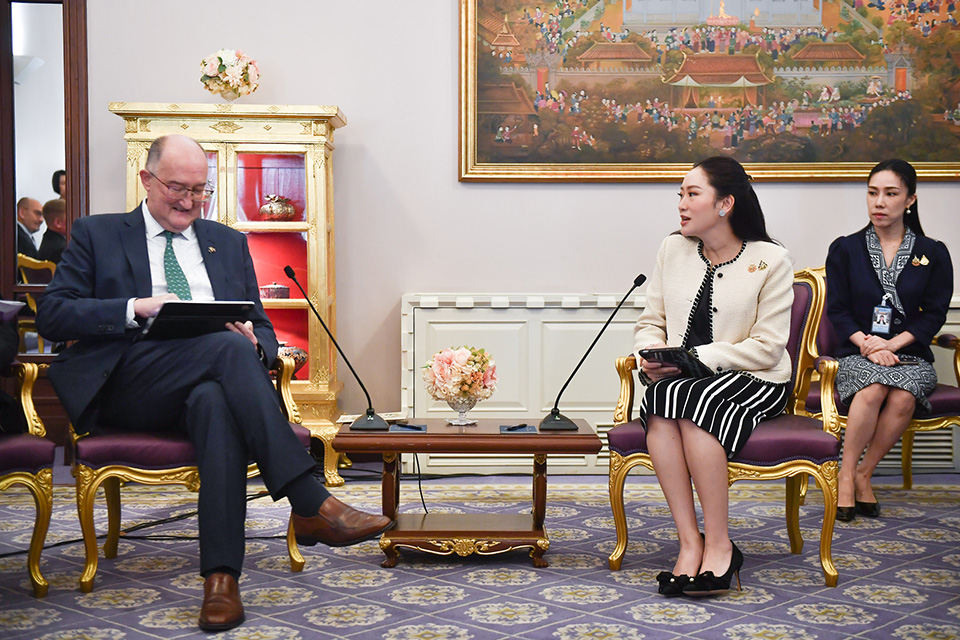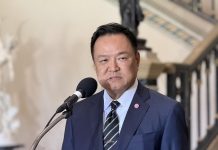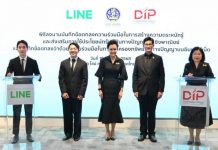
BANGKOK, Thailand – Executives and members of the EU-ASEAN Business Council (EU-ABC) and European Association for Business and Commerce (EABC) paid a courtesy call on Prime Minister Paetongtarn Shinawatra. Participating in the meeting were Minister of Foreign Affairs Maris Sangiampongsa, PM’s Secretary-General Prommin Lertsuridej, and Thai Trade Representative Werapong Prapha. Deputy Government Spokesperson Sasikarn Watthanachan disclosed gist of the meeting as follows:
H.E. Mr. David Daly, Ambassador of the European Union to Thailand, Mr. Noel Clehane, Vice-Chairman of the Executive Board of EU-ABC, and President of EABC Thailand Paranee Adulyapichet led a delegation of European companies operating in ASEAN in 5 business sectors: Finance and Insurance; Consumer Goods; Transport, Logistics and Energy; Chemicals, Pharmaceuticals and Agricultural Products; and Consulting to pay a courtesy call on the Prime Minister.
The Prime Minister welcomed and was pleased to meet with executives and members of the EU-ABC and EABC on the day, which is a good opportunity to let the European private sector know about the Government’s vision and important policies, and to exchange views and opinions. During the course of the World Economic Forum in January, she met with a number of European Government and business leaders, and informed them of Thailand’s readiness to welcome and support European private sector investment, as there are great potentials for both parties to expand cooperation, especially in sustainability, green transition and digital.
The EU Ambassador expressed appreciation toward the Prime Minister for the warm welcome and reaffirmed that EU is Thailand’s reliable and trustworthy partner through strong cooperation in trade and investment. EU is Thailand’s fourth largest trading partner and has invested more than 43 billion euros in the country, creating more than 160,000 jobs in 19,000 Thai companies. Additionally, EU is the third largest origin of tourists traveling to Thailand. The EU Ambassador was of the view that both sides have potential to further enhance cooperation in many areas. Today’s EU-ABC and EABC delegations represented world-renowned European private firms with world-class technology, products and services.
Vice-Chairman of EU-ABC Executive Board was pleased to lead the delegation of European companies operating in ASEAN to meet with the Prime Minister, and thanked the Thai Government for hosting meetings between relevant ministers/government agencies and representatives of European companies in ASEAN on several occasions. The EU-ABC is the voice of the European private sector in ASEAN and has a long history of strong and constructive relations with Thailand. He stressed that Thailand is of great importance to the European private sector and has attracted attention both economically and politically. Thailand also has excellent industrial infrastructure and is gateway to ASEAN. According to the latest survey on business sentiment, the European private sector remains confident in doing business in Thailand, especially in its ability to achieve sustainability goals and recover from COVID-19.He believed that the FTA would be a mechanism to support stronger trade and investment cooperation between the two parties.
President of EABC Thailand expressed her pleasure to have attended the meeting today, and affirmed that EABC is ready to collaborate with the Thai Government in driving economic empowerment and transition. EABC Thailand is confident that the FTA can unlock Thailand’s trade and investment potential, and enable the country to become a key player in global supply chain, especially amidst the current geopolitical tensions. She also commended the Government’s commitment and effort in promoting ease of doing business, transparency, and economic stability. EABC is ready to enhance cooperation with the Government in potential areas, especially in digital transformation, healthcare, finance, and tourism and services, etc.
The Prime Minister took the occasion to present the Government’s vision and policies, which focus on economic and social development and people-centeredness, along with promoting sustainability, prosperity, and inclusiveness. The Thai Government commits to support business operation and growth to attract foreign investments. In the short term, the Government strives to undertake economic stimulation through promoting trade and tourism, while competitiveness and investment enhancement is aimed for the longer term, especially through accelerating FTA negotiations and ascending to the Organization for Economic Co-operation and Development (OECD), which will support business operations, administration, anti-corruption, and effective investment policies.
On trade, the Prime Minister hoped that the free trade agreement between Thailand and the European Free Trade Association (EFTA) signed in January (Thailand’s 16th free trade agreement and its first with European nations) would help pave the way for the sooner finalization of the Thailand-EU FTA negotiations to sustain competitiveness, resilience and stability of the supply chain.
Ease of doing business: The Government is committed to promoting Thailand as major investment destination by creating an environment conducive to business operations and developing modern infrastructure. Wide-ranging measures have been implemented, such as the policy for regional headquarters (ROH) which encourages foreign companies to set up regional headquarters in Thailand and enjoy tax benefits and incentives. Economic restructuring is also underway to lay a strong foundation for the future through empowering traditional industries (i.e., automotive industry and soft power), and promoting future industries (i.e., green and digital industries and healthcare economy), as well as investing in infrastructure, such as, research and innovation, transport and logistics, public utilities, digital technology, and taxation.
The Government also plans to promote investment to accelerate Thailand’s transition into a global manufacturing hub in such industries as advanced electronics and semiconductors, automotive/EVs/ batteries, renewable energy and bioenergy, and the digital economy and technology.
Climate Action and Green Transition: The Government prioritizes sustainability and has made progress under the Climate Change Act. Thailand sets goals to increase share of renewable energy generation to 50% by 2040, achieve carbon neutrality by 2050, and net zero greenhouse gas emissions by 2065.
Connectivity hub: The Government aims to leverage Thailand’s strategic location to promote the country as regional connectivity hub. Rail, sea, air, and road connectivity have been developed, and new special economic zones have been established across the country. A number of megaprojects have also been implemented, i.e., construction of new airports and the Landbridge project to connect the Pacific and Indian Oceans, on which the Government has been in talks with many countries and has received significant interest and support. The Landbridge project would significantly reduce transportation time and costs.
With regard to tourism and soft power, the Government has extended the 60-day visa exemption for citizens of 93 countries/territories and granted visa on arrival for citizens of 31 countries/territories, resulting in an increase in the number of foreign tourists by more than 35.5 million in 2024. It has also sped up work permit and visa application process, and offered welfare incentives to attract high-potential foreigners and talents to reside or work in Thailand.
The Prime Minister reaffirmed Thailand’s readiness to welcome foreign business operators. With clear-cut policies and enticing investment privileges, there is no better time to invest in Thailand than now. She invited the EU-ABC and EABC delegates to be a part of Thailand’s endeavor to create sustainable and inclusive future. The Government is ready to work with the European private sector for mutual benefits.
The EU-ASEAN Business Council (EU-ABC) is the primary voice for European business within the ASEAN region. Recognized by both the European Commission and the ASEAN Secretariat, and accredited under Annex 2 of the ASEAN Charter, the EU-ABC serves as an independent body committed to promoting European business interests and driving policy and regulatory changes that enhance trade and investment between Europe and ASEAN. The EU-ABC’s membership consists of 78 large European Multi-National Corporations and 9 European Chambers of Commerce from around Southeast Asia, including the European Association for Business and Commerce (EABC) which comprises 156 member companies. (PRD)










